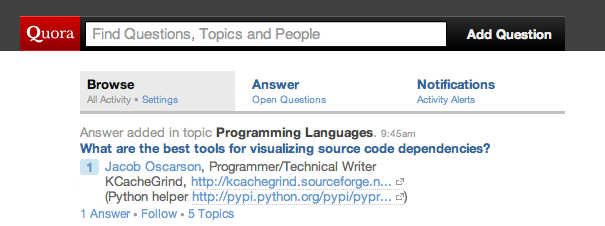Want smarter insights in your inbox? Sign up for our weekly newsletters to get only what matters to enterprise AI, data, and security leaders. Subscribe Now
 Quora, the question-and-answer site that has become the new obsessive past-time of Silicon Valley insiders, raised funding in a first round led by Benchmark Capital. The company’s co-founders, Adam D’Angelo, who was Facebook’s chief technology officer and Charlie Cheever, who was another early Facebook engineer, also invested. Matt Cohler, another early Facebook executive, joins the board from Benchmark.
Quora, the question-and-answer site that has become the new obsessive past-time of Silicon Valley insiders, raised funding in a first round led by Benchmark Capital. The company’s co-founders, Adam D’Angelo, who was Facebook’s chief technology officer and Charlie Cheever, who was another early Facebook engineer, also invested. Matt Cohler, another early Facebook executive, joins the board from Benchmark.
D’Angelo confirmed the round through Quora, but didn’t disclose the size. Michael Arrington of TechCrunch says sources are telling him Quora’s valuation is $86 million and the company raised $11 million. We have a Q&A with the pair here. They’re a team of four, with an engineer from Twitter and a recent Stanford grad coming on shortly.
Although D’Angelo said he hadn’t planned on raising a round, he realized that he wanted to hire more engineers and designers. Knowing Cohler from his days at Facebook helped make Benchmark Quora’s choice for an investor. The funding marks yet another success for startups from former Facebook employees. Benchmark also backed Asana, the productivity startup from Facebook co-founder Dustin Moskovitz. (Storm8 and Path.io are other startups that have come former Facebookers.)
At its core, the company’s model is pretty simple. Ask a question. Get an answer from the crowd.
However, what makes Quora unique from all the other wildly different takes on the question-and-answer idea like Yahoo! Answers, Hunch, Formspring and Aardvark, is its elegant community design. I’m not necessarily referring to the visual appearance of the site, although that’s very clean too. It’s the subtle incentives that Quora has built in to entice people to give the highest quality responses to a question.
For example, the default is not to answer a question anonymously. Having your identity out there makes you more accountable for the answers you give. Plenty of Quora’s users understand that others are judging them by the thoughtfulness of their responses. And because Quora takes the asynchronous ‘following’ model popularized by Twitter, great users can attract huge followings of people.
Another incentive is that there are Digg-like voting features to push strong responses higher in the answer ranking and bury ones that are weak. When you add questions, auto-suggest will show you other similar ones. That discourages duplicate questions. There’s also a ‘Merge’ feature for topics and questions that works as another backstop for repetitive content.
The team has also been extremely careful about scaling the product to make sure that community members understand the tone of discussion. That’s why they haven’t opened it up to the public. They’re using an invite strategy, akin to how Gmail slowly rolled out to people.
D’Angelo says the site will probably open up to search engines shortly and there might be deeper integrations that push answers to Facebook and Twitter.
For now, Quora’s content is mostly insider talk about entrepreneurship, business strategy and technical approaches. We’ll be watching how it evolves as it grows up.

